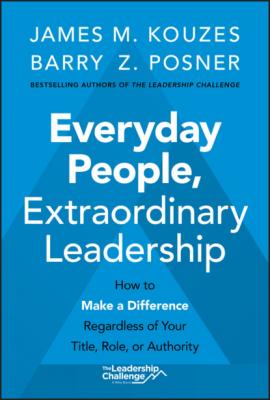ТОП просматриваемых книг сайта:















Everyday People, Extraordinary Leadership. James M. Kouzes
Читать онлайн.Название Everyday People, Extraordinary Leadership
Год выпуска 0
isbn 9781119686972
Автор произведения James M. Kouzes
Жанр Управление, подбор персонала
Издательство John Wiley & Sons Limited
The individuals selected most frequently as leadership role models—family members, teachers, coaches, immediate supervisors, and co-workers—also make evident the most important finding of all. They underscore the truth that leadership is a relationship. Leadership is a relationship between those who aspire to lead and those who choose to follow. This is true regardless of whether the relationship is one-to-one or one-to-many. If you are going to be a leader whose guidance others want to follow willingly, there must be a human connection, something that binds you and others together. It's the quality of this relationship that will determine over the long term whether others will follow your lead or not. To lead effectively, you have to appreciate the underlying dynamics of the leader-constituent relationship. It's extremely important to understand, therefore, the qualities that people look for in the leaders they would willingly follow. If people are going to want to follow you over the course of a project or the course of a career, what do they most want to see in your behavior?
A relationship between people characterized by fear and distrust will never produce anything of lasting value. A relationship characterized by mutual respect and confidence will overcome the greatest adversities and leave a legacy of significance. Any discussion of leadership must attend to the dynamics of this relationship. Strategies, tactics, skills, and techniques are empty without an understanding of the essential human aspirations that connect people with their leaders and leaders with their people.
Credibility Is the Foundation of Leadership
What sort of person would you listen to, take advice from, be influenced by, and willingly follow, not because you have to, but because you want to? What does it take for you to be the kind of person that others want to follow, doing so enthusiastically and voluntarily? Understanding and responding to these expectations is essential to the exercise of exemplary leadership.
To understand this leader-constituent relationship we have routinely been conducting surveys over the past 40 years about the personal values, traits, and characteristics that people indicate are most important to them in an individual they would willingly follow. A key word in this sentence is “willingly.” It is one thing to follow someone because you think you have to “or else,” and it's another when you follow an individual because you want to.
We've gathered responses from more than 120,000 respondents, and they have been striking in their consistency over the years.4 Our evidence shows that people must pass several essential character tests before they earn the designation of leader from other people, as demonstrated by the data presented in Table 1.2.
All the characteristics receive votes, and therefore each one is important to at least some individuals. What is most evident, however, is that over time, across continents, demographic, and organizational differences, only four have continuously received the majority (over 60 percent) of the preferences. What people most look for and admire in a leader has been constant. If people are going to follow someone willingly, they must believe the individual is honest, competent, inspiring, and forward-looking.
TABLE 1.2 Personal Values, Traits, and Characteristics That People Look for in Their Leaders*
| Value, Trait, or Characteristic | Percentage of Respondents Selecting This Category* |
|---|---|
| Honest (truthful, has integrity, trustworthy, has character, ethical) | 87 |
| Forward-looking (visionary, foresighted, concerned about the future, has sense of direction) | 69 |
| Competent (capable, proficient, effective, gets the job done, professional) | 67 |
| Inspiring (uplifting, enthusiastic, energetic, optimistic, positive about future) | 66 |
| Intelligent (bright, smart, intellectual, logical) | 45 |
| Broad-minded (open-minded, flexible, receptive, tolerant) | 38 |
| Dependable (reliable, conscientious, responsible) | 34 |
| Supportive (helpful, offers assistance, comforting) | 36 |
| Fair-minded (just, unprejudiced, objective, forgiving) | 40 |
| Straightforward (direct, candid, forthright) | 34 |
| Cooperative (collaborative, team player, responsive) | 27 |
| Courageous (bold, daring, gutsy) | 24 |
| Caring (appreciative, compassionate, concerned, loving, nurturing) | 22 |
| Determined (dedicated, resolute, persistent, purposeful) | 22 |
| Imaginative (creative, innovative, curious) | 22 |
| Ambitious (aspiring, hard-working, striving) | 19 |
| Mature (experienced, wise, has depth) | 16 |
| Loyal (faithful, dutiful, unswerving in allegiance, devoted) | 15 |
| Self-controlled (restrained, self-disciplined) | 10 |
| Independent (self-reliant, self-sufficient, self-confident) | 6 |
* Note that several synonyms are included in each category.
While the fact that what people look for in their leaders has remained consistent over time, despite the ever-shifting forces affecting economic and social life, there is another profound implication revealed by this data. These survey results have a solid conceptual foundation in what social psychologists and communications experts refer to as “source credibility.”
In assessing the believability

